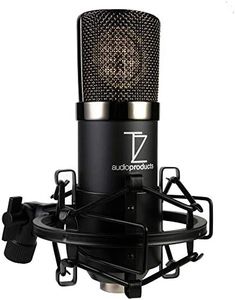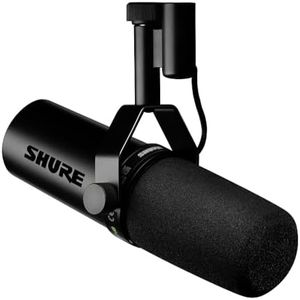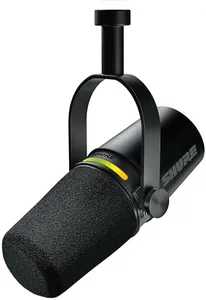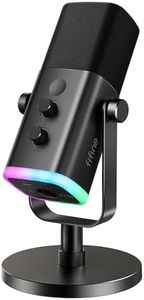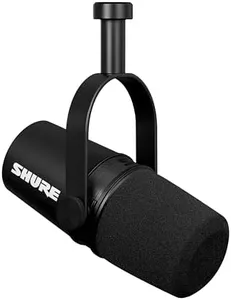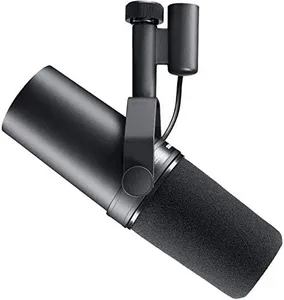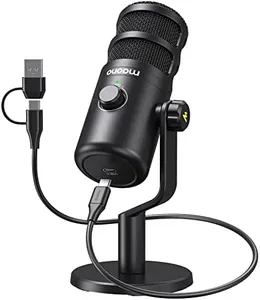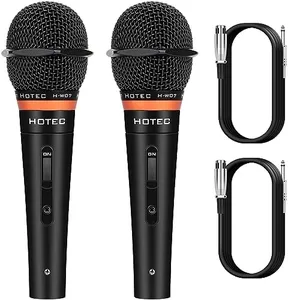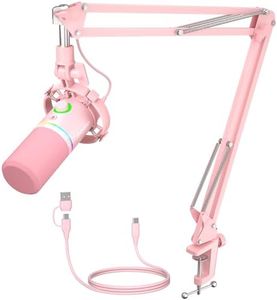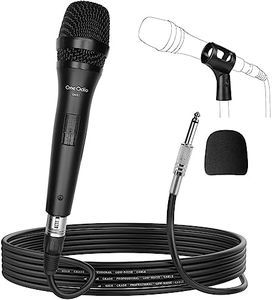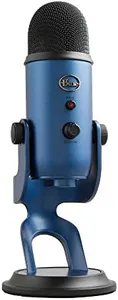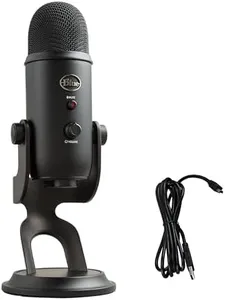10 Best Recording Microphones For Vocals 2026 in the United States
Our technology thoroughly searches through the online shopping world, reviewing hundreds of sites. We then process and analyze this information, updating in real-time to bring you the latest top-rated products. This way, you always get the best and most current options available.

Our Top Picks
Winner
Shure SM7dB Dynamic Vocal Microphone with Built-in Preamp – Studio Mic for Streaming, Podcasting, and Recording – Smooth Sound, Wide Frequency Range, Rugged Build, Windscreen Included, XLR, Black
Most important from
12754 reviews
The Shure SM7dB is a dynamic vocal microphone that has quickly gained popularity among podcasters, streamers, and musicians. One of its standout strengths is its legendary warm sound, which makes it appealing for various vocal applications. It features a built-in preamp that offers two gain levels: plus 18dB and plus 28dB. This flexibility is great for capturing both loud sources and softer vocals with clarity. Additionally, the cardioid polar pattern helps isolate your voice from background noise, making it suitable for less-than-ideal recording environments.
The wide frequency response of 50 to 20,000 Hz ensures that you capture the full range of your voice, from rich lows to crisp highs. This, combined with the ability to tweak your sound signature using accessible switches on the back, makes it a versatile choice for different vocal types and instruments. Its rugged construction and included windscreen add to its durability, making it a reliable tool for traveling content creators.
There are a few drawbacks to consider. The microphone requires a mixer or interface with 48V phantom power to utilize the built-in preamp, which may not be ideal for everyone. Additionally, while the SM7dB is known for its excellent sound quality, it may not suit those who prefer a brighter or airier vocal sound, as its warm tone might feel slightly subdued. Finally, it's a bit heavier than some other microphones in its class, which could be a consideration for those who need lightweight options.
Most important from
12754 reviews
Shure MV7+ Podcast Dynamic Microphone – OBS Certified, Enhanced Audio, LED Panel, USB-C & XLR Outputs, Auto Level Mode, Digital Pop Filter, Reverb Effects – for Podcasting, Streaming, Recording, Black
Most important from
4216 reviews
The Shure MV7+ is a dynamic microphone designed primarily for podcasting, streaming, and vocal recording. Its unidirectional polar pattern helps focus on your voice while minimizing background noise, which is great for less-than-perfect recording environments. The mic’s digital features like Auto Level Mode and a real-time denoiser automatically adjust volume and reduce unwanted sounds, making it beginner-friendly and effective without extra gear.
Connectivity is a strong point here, offering both USB-C and XLR outputs, so you can use it with simple computer setups or more advanced audio interfaces, giving you flexibility as your recording skills grow. The LED touch panel adds a modern touch, allowing quick muting and visual feedback, which is convenient for live streaming or video calls. Built-in reverb effects provide options to add depth to your recordings, something not always found in microphones at this level. The sensitivity rating is 40 dB, and the signal-to-noise ratio is 60 dB, indicating decent audio capture quality though not ultra-high-end.
Weighing nearly 2 pounds and made of metal, it feels solid and durable but might be a bit heavy for handheld use during long sessions. The Shure MV7+ is a solid choice for podcasters, streamers, and content creators looking for a versatile, easy-to-use microphone with modern features and good sound quality, especially in environments where background noise is a concern.
Most important from
4216 reviews
FIFINE USB/XLR Dynamic Microphone for Podcast Recording, PC Computer Gaming Streaming Mic with RGB Light, Mute Button, Headphones Jack, Desktop Stand, Vocal Mic for Singing YouTube-AmpliGame AM8
Most important from
10198 reviews
The FIFINE AMPLIGAME AM8 is a versatile dynamic microphone that can be used for podcasting, gaming, streaming, and vocal recording. It offers both USB and XLR connectivity, making it suitable for beginners and professionals. The microphone has a unidirectional polar pattern, which helps to capture clear audio by rejecting off-axis noise. The frequency response range of 50Hz-16KHz ensures balanced audio, making it ideal for vocal clarity and resonance.
It includes handy features like a mute button, headphone jack for real-time monitoring, and RGB lighting to match your gaming setup. The RGB lights have customizable modes and colors, adding an aesthetic appeal for gamers and streamers. The microphone also comes with a desktop stand, making it convenient to set up and use right away.
One downside is that the XLR cable and mic boom arm are not included, which means additional purchases may be necessary for a complete setup. Additionally, some of the advanced features, like the RGB lighting and monitoring volume control, are only available in USB mode. The microphone's self-noise level is 80 dB, which may not be ideal for extremely quiet environments, but it should suffice for most home studios and casual recording setups. With durable construction and compatibility with various devices like laptops, desktops, mixers, and sound cards, the FIFINE AMPLIGAME AM8 offers a good balance of convenience and performance for users looking to enhance their recording experience.
